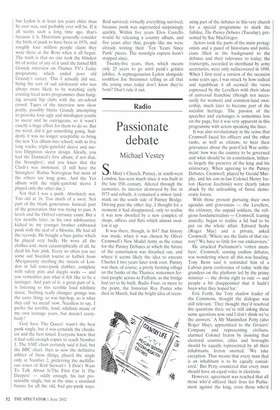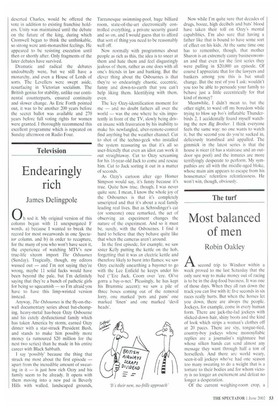Radio
Passionate debate
Michael Vestey St Mary's Church, Putney, in south-west London, has seen much since it was built in the late 15th century. Altered through the centuries, its interior destroyed by fire in 1973 and rebuilt, it remained a minor landmark on the south side of Putney Bridge. Driving past the other day, I thought for a moment it had disappeared, only to realise it was now dwarfed by a new complex of shops, offices and flats which almost swallow it up.
It was there, though, in 1647 that history was made, when it was chosen by Oliver Cromwell's New Model Army as the venue for the Putney Debates at which the future of the constitution was thrashed out, and where it seems likely the idea to execute Charles I two years later took root. Putney was then, of course, a pretty farming village on the banks of the Thames; watermen ferried people across to Fulham, as the bridge had yet to be built. Radio Four, or more to the point, the historian Roy Porter who died in March, had the bright idea of recre
ating part of the debates in this very church for a special programme to mark the Jubilee, The Putney Debates (Tuesday), presented by Sue MacGregor.
Actors took the parts of the main protagonists and a panel of historians and politicians filled in the background to the debates and their relevance to today; the transcripts, recorded in shorthand by army secretaries, were only rediscovered in 1890. When I first read a version of the occasion some years ago, I was struck by how radical and republican it all seemed: the views expressed by the Levellers with their ideas of universal franchise (though not necessarily for women) and common-land ownership, much later to become part of the socialist heritage. The passion of the speeches and exchanges is sometimes lost on the page, but it was very apparent in this programme with actors speaking the lines.
It was also revolutionary in the sense that Cromwell faced his officers and the other ranks, as well as citizens, to hear their grievances about the post-Civil War settlement: how was the country to be governed and what should be its constitution, hitherto largely the preserve of the king and his aristocracy. When agreeing to the Putney Debates, Cromwell, played by Gerald Murphy, and his son-in-law Colonel Henry Ireton (Kieron Jecchinis) were clearly taken aback by the unleashing of fierce democratic forces.
With those present pursuing their own agendas and grievances — the Levellers, the citizenry, the unpaid soldiers, the religious fundamentalists — Cromwell, fearing anarchy, began to realise a lid had to be put on the whole affair. Edward Sexby (Roger May) and a private, asked Cromwell, 'Where are the fruits of that victory? We have so little for our endeavours.'
He attacked Parliament's 'rotten members'. Cromwell, sensing endless debates, was wondering where all this was heading. Tony Benn said it reminded him of a Labour party conference of today 'with the grandees on the platform led by the prime minister — the divine right to rule — and people a bit disappointed that it hadn't been what they hoped for.'
Eric Forth, the Tory shadow leader of the Commons, thought the dialogue was still relevant. 'They thought they'd resolved the questions then; we're still asking these same questions now and I don't think we've the answers.' A Mr Maximilian Petty (also Roger May), apprenticed to the Grocers' Company and representing civilians, alarmed Colonel Ireton by insisting that electoral counties, cities and boroughs should be equally represented by all their inhabitants. Ireton snorted, 'We take exception. That means that every man that is an inhabitant is to be equally considered.' But Petty countered that every man should have an equal voice in elections.
However, agreement was reached that all those who'd offered their lives for Parliament against the king, even those who'd deserted Charles, would be offered the vote in addition to existing franchise holders. Unity was maintained until the debate on the future of the king, during which Cromwell began to think the unthinkable, so strong were anti-monarchist feelings. He appeared to be resisting execution until then or shortly after. Only fragments of the later debates have survived.
Dramatic and radical the debates undoubtedly were, but we still have a monarchy, and even a House of Lords of sorts. The Levellers were swept aside, resurfacing in Victorian socialism. The British genius for stability, unlike our continental counterparts, ensured continuity and slower change. As Eric Forth pointed out, it was to be another 200 years before the secret ballot was available and 270 years before full voting rights for women were granted. I thoroughly recommend this excellent programme which is repeated on Sunday afternoon on Radio Four.







































































 Previous page
Previous page